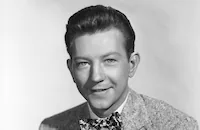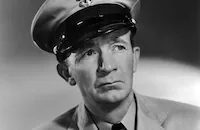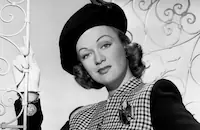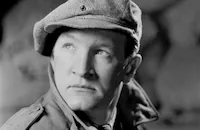Curtain Call at Cactus Creek
Cast & Crew
Charles Lamont
Donald O'connor
Gale Storm
Walter Brennan
Vincent Price
Eve Arden
Film Details
Technical Specs

Synopsis
Bank robber Rimrock Thomas arrives in Cactus Creek, Arizona with his men, just ahead of a troupe of traveling entertainers, which includes front man Edward Timmons, aging actress Lily Martin, her niece Julie Martin, youthful actor Ralph and hammy lead actor Tracy Holland. The presence of the entertainers disrupts Rimrock's plans to rob the local bank, but when he learns that Lily will be performing, he decides to stay in town to see her. He plans for his men to carry out the robbery during the show, while he feasts his eyes on Lily. Eddie, who is in love with Julie, has dreams of going on the stage, but Tracy refuses to give him a chance as Eddie is too useful as a one-man stage manager, musician, lighting operator, sound effects man and general errand runner to lose to acting. That evening, while the troupe performs a creaky melodrama in front of a rowdy audience, Rimrock watches Lily from a window at the top of the stage. Eddie's attempts to chase him away completely disrupt the performance, and then an explosion set by Rimrock's men empties the theater as the townspeople take off after the bandits. After ordering Eddie to pack up and join them in the town of Powder River, Tracy and the other actors take the opportunity to flee before the audience can demand its money back. Rimrock eludes the posse and hides in Eddie's wagon. Once Eddie reaches the outskirts of town, Rimrock's men stop him and commandeer his wagon. Rimrock then gets the idea of using the show troupe as a cover for his bank robberies and pretends to chase his men away. He figures that if he travels with Eddie, he can do the advance work and then send for his men. Not realizing that he has an ulterior motive, Eddie suggests that Rimrock replace him so that Tracy will no longer have an excuse to stop him from acting. Although Tracy does not really like Eddie's plan, Rimrock, who is using the name Hardrock Johnson, privately forces Tracy to agree. He then has his men incapacitate Ralph so that Eddie will get a chance to perform for the audience. That evening, Eddie and Julie sing a song together, and Eddie dances while Rimrock's men hold up the bank. Afterward, Clay, the marshal, and the local banker question Eddie about Rimrock, and then arrest him as an accomplice. Rimrock soon breaks Eddie out of jail, however, and offers to train him as the head of the gang. That night, while they all sleep, Eddie, who cannot visualize himself as a bandit, runs off with the proceeds of the robbery to say goodbye to Julie. She insists that he confront his accusers, but while they talk, Eddie is spotted by a local citizen, who rouses the others and chases him back to Rimrock's hideout. A shootout ensues, and the gang takes off, followed by Clay. Eddie assures Rimrock that he did not intentionally lead the marshal to the hideout. Rimrock, who has become very fond of Eddie, then arranges it to look as if Eddie has captured him. After Eddie receives the $26,000 in reward money for Rimrock's capture, he becomes a big success, starring in his own minstrel show with Julie. Later, Rimrock is released from jail and plays "Mammy."

Director
Charles Lamont
Cast

Donald O'connor
Gale Storm

Walter Brennan

Vincent Price

Eve Arden
Chick Chandler

Joe Sawyer
Harry Shannon
Rex Lease
I. Stanford Jolley
Crew
Felix Arndt
Robert Arthur
Oscar Brodney
Robert Brower
Leslie I. Carey
George L. Cobb
Louis Da Pron
Richard De Weese
John F. Decuir
Howard Dimsdale
Howard Dimsdale
Russell A. Gausman
Frank Gross
Bernard Herzbrun
William Holland
Fred W. Leigh
Ruby R. Levitt
Henry I. Marshall
Russell Metty
Stanley Murphy
Rosemary Odell
Henry E. Pether
Stanley Roberts
Walter Scharf
Joan St. Oegger
Bud Westmore
Jack Yellen

Film Details
Technical Specs

Articles
Donald O'Connor, 1925-2003
Born Donald David Dixon O' Connor in Chicago on August 28, 1925, he was raised in an atmosphere of show business. His parents were circus trapeze artists and later vaudeville entertainers, and as soon as young Donald was old enough to walk, he was performing in a variety of dance and stunt routines all across the country. Discovered by a film scout at age 11, he made his film debut with two of his brothers in Melody for Two (1937), and was singled out for a contract by Paramount Pictures. He co-starred with Bing Crosby and Fred MacMurray in Sing, You Sinners (1938) and played juvenile roles in several films, including Huckleberry Finn in Tom Sawyer - Detective (1938) and the title character as a child in Beau Geste (1939).
As O'Connor grew into adolescence, he fared pretty well as a youthful hoofer, dancing up a storm in a string of low-budget, but engaging musicals for Universal Studios (often teamed with the equally vigorous Peggy Ryan) during World War II. Titles like What's Cookin', Get Hep to Love (both 1942), Chip Off the Old Block and Strictly in the Groove (both 1943) made for some fairly innocuous entertainment, but they went a long way in displaying O'Connor's athletic dancing and boyish charm. As an adult, O'Connor struck paydirt again when he starred opposite a talking mule (with a voice supplied by Chill Wills) in the enormously popular Francis (1949). The story about an Army private who discovers that only he can communicate with a talking army mule, proved to be a very profitable hit with kids, and Universal went on to star him in several sequels.
Yet if O'Connor had to stake his claim to cinematic greatness, it would unquestionably be his daringly acrobatic, brazenly funny turn as Cosmo Brown, Gene Kelly's sidekick in the brilliant Singin' in the Rain (1952). Although his self-choreographed routine of "Make "Em Laugh" (which includes a mind-bending series of backflips off the walls) is often singled out as the highlight, in truth, his whole performance is one of the highlights of the film. His deft comic delivery of one-liners, crazy facial expressions (just watch him lampoon the diction teacher in the glorious "Moses Supposes" bit) and exhilarating dance moves (the opening "Fit As a Fiddle" number with Kelly to name just one) throughout the film are just sheer film treats in any critic's book.
After the success of Singin' in the Rain, O'Connor proved that he had enough charisma to command his first starring vehicle, opposite Debbie Reynolds, in the cute musical I Love Melvin (1953). He also found good parts in Call Me Madam (1953), There's No Business Like Show Business (1954), and Anything Goes (1956). Unfortunately, his one attempt at a strong dramatic role, the lead in the weak biopic The Buster Keaton Story (1957) proved to be misstep, and he was panned by the critics.
By the '60s, the popularity of musicals had faded, and O'Connor spent the next several years supporting himself with many dinner theater and nightclub appearances; but just when it looked like we wouldn't see O'Connor's talent shine again on the small or big screen, he found himself in demand at the dawn of the '90s in a string of TV appearances: Murder She Wrote, Tales From the Crypt, Fraser, The Nanny; and movies: Robin Williams' toy-manufacturer father in Toys (1992), a fellow passenger in the Lemmon-Matthau comedy, Out to Sea (1997), that were as welcoming as they were heartening. Survivors include his wife, Gloria; four children, Alicia, Donna, Fred and Kevin; and four grandchildren.
by Michael T. Toole














